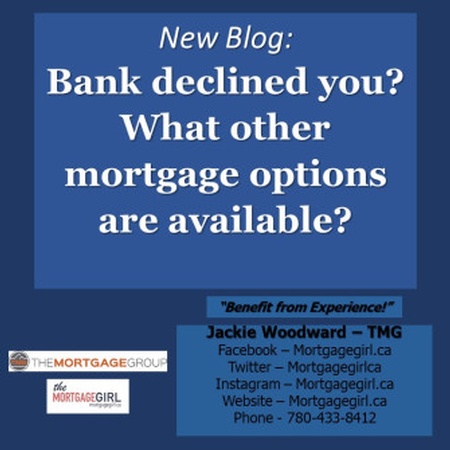Bank declined you? What other mortgage options are available?

With all of the significant government mortgage rule changes I have personally seen a growing segment of the population finding it more difficult to qualify with a prime lender at best rates for a number of reasons.
Borrowers with recent credit issues, or those who just don’t make enough income to qualify in the price range they want to buy in now seems to be the new normal. The largest impact I see in meeting the new qualifying guidelines is for those who are self-employed and drawing lower personal incomes for income tax purposes.
Basically, what is happening is tighter government regulations have forced borrowers to consider alternative lenders to provide solutions while they get themselves into a position where they can then go back and get the best rates through the prime lenders.
For those considering a mortgage through a non-traditional lender, I strongly suggest you consult at least one experienced, reputable broker to find out more about the options available these days.
As an experienced Mortgage Broker with 35 years experience in the mortgage industry I will start with a review of my client’s current financial profile and determine if they fit into the A, B or C category of lending. Each of these lender types will charge a variety of different interest rates and each have different requirements that must be met by the borrower in order to qualify. Below are brief descriptions of the most notable differences;
‘A’ Lenders
Also known as ‘prime lenders’, these lenders offer best rates in exchange for strict mortgage application and property requirements. They often offer generous pre-payment privileges and no upfront fees are charged. In this group you will find Banks, Credit Unions and Mortgage Companies. There are a number of conditions you must meet in order for your mortgage to qualify through an ‘A’ lender. If you don’t fit into that box, don’t worry as there are other financing options available to you, though you may be required to contribute more of a downpayment.
In terms of document requirements, the ‘A’ lenders don’t have very much flexibility. If you are unable to provide any of the requested documentation, the majority of the ‘A’ Lenders may accept some kind of alternative, though the list is pretty short. If you do anticipate some issues, ensure you have a detailed chat with your Mortgage Professional about what kind of documents you can provide as it’s easier for them to know upfront about document alternatives than to ask for exceptions later.
‘B’ Lenders
Also known as “subprime” or “alternative” lenders as they tend to do the mortgage financing that the “prime” or ‘A’ lenders pass on. When you’re sitting just outside the box, the ‘B’ lenders may just be a perfect fit for you in the short term. They tend to be more forgiving and understanding if you have any credit issues, are newly self-employed, or your downpayment source is not meeting the “A” lending standards. In return for overlooking some minor flaws with your financial profile, they will charge a bit of a higher interest rate and there is a chance of having to pay an upfront fee to them.
The ‘B’ Lenders max out at financing 80% of your home value so you must have a minimum of 20% down payment, however, as every borrower’s situation is different, these lenders tend to favour common sense over firm policies and procedures.
‘C’ lenders
These types of lenders are more commonly known as private lenders, and you may know them as individuals who have some extra money to lend at a relatively high interest rate with substantial upfront fees. Majority of private lenders I work with are groups of lenders such as Mortgage Investment Corporations (MICs) and Real Estate Investment Trusts. (REITs). Offering mostly 1st and 2nd mortgages, these lenders have considerably more flexibility for borrowers and offer products to those who may have some credit challenges or their income has been inconsistent. The private lenders work on a case-by-case basis and in turn it is up to your Mortgage Professional to negotiate a rate and term on your behalf. They may lend you more than 80% of the home value, however, the higher fees charged at that level may not be worth it to borrow higher than the 80%
Contact the MortgageGirlca today and put her over 35 years of experience to work for you. Contact her by phone – 780-433-8412 or email – info@mortgagegirl.ca. Follow her on Facebook (MortgageGirl.ca), Twitter (MortgageGirlca) or read more of her blogs (mortgagegirls.wordpress.com)